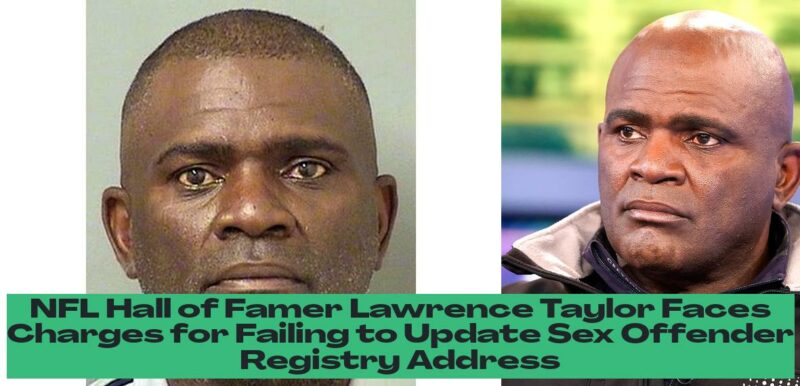NFL Hall of Famer Lawrence Taylor Charged with Failing to Update Address on Sex Offender Registry
Lawrence Taylor, a legendary figure in the world of American football, has once again found himself in legal trouble. The NFL Hall of Famer, renowned for his fierce tackles and dominant presence on the field for the New York Giants, was charged in Florida with failing to update his address on the state’s sex offender registry. This isn’t the first time Taylor has faced such charges, as he was previously convicted of sexual misconduct in New York in 2011 and subsequently placed on the registry. The recent development has sparked widespread discussions about accountability and the responsibility of those convicted of sex offenses.
According to court records, Taylor turned himself in to the Broward County Sheriff’s Office on Wednesday and was released without bail. The charges stem from Taylor’s failure to notify authorities of a change in his residence, a requirement for all registered sex offenders. The former linebacker has been charged with a third-degree felony, which carries a potential sentence of up to five years in prison. This is not Taylor’s first run-in with the law concerning the sex offender registry. In 2021, he was also charged with the same offense but blamed his divorce for the oversight. However, his argument seems less convincing this time around, with the court records indicating he was aware of the requirement to update his address.
Taylor’s legal woes have cast a dark shadow on his illustrious career. A dominant force on the field, he was inducted into the Pro Football Hall of Fame in 1999, a testament to his unparalleled talent and impact on the sport. However, his off-the-field misdeeds have tarnished his legacy, raising questions about the responsibility of athletes and public figures to maintain a clean record. The charges against him serve as a stark reminder that even those who have achieved immense success can face consequences for their actions, especially when it comes to criminal offenses.
The charges against Taylor have also sparked a broader conversation about the nature of sex offender registries and the effectiveness of such measures. While the intent behind these registries is to protect the public, critics argue that they can be overly punitive and have a stigmatizing effect on individuals. They point out that the registries often lump together individuals convicted of a wide range of offenses, regardless of the severity or nature of their crimes. This, they argue, can lead to unfair treatment and hinder convicted individuals’ efforts to reintegrate into society.
The case of Lawrence Taylor highlights the complexities surrounding sex offender registries and the delicate balance between public safety and the rights of individuals. While Taylor’s actions have undoubtedly violated the law, the question remains: are these registries the most effective way to ensure the safety of communities? As Taylor faces his legal challenges, the debate over sex offender registries is likely to continue, prompting discussions about finding a fairer and more nuanced approach to dealing with individuals convicted of sex offenses.
- Lawrence Taylor, NFL Hall of Famer, was charged with failing to update his address on the sex offender registry in Florida.
- Taylor’s legal troubles stem from a previous conviction of sexual misconduct in New York in 2011, leading to his placement on the registry.
- He faces a third-degree felony charge, which could result in up to five years in prison for failing to notify authorities of his change in residence.
- Despite blaming his divorce for the oversight in a previous incident, court records suggest Taylor was aware of the requirement to update his address this time.
- The case has sparked discussions about accountability for those convicted of sex offenses and raised questions about the responsibilities of public figures like athletes to maintain a clean record.
Navigating the Complexities of Sex Offender Registries
The recent charges against Lawrence Taylor have brought renewed attention to the intricate workings of sex offender registries, highlighting the challenges and complexities surrounding their implementation and impact. These registries, often perceived as a vital tool for public safety, have become a contentious subject, prompting debates about their effectiveness, fairness, and potential for unintended consequences.
Advocates for sex offender registries argue that they are essential for protecting communities, particularly vulnerable populations like children, from individuals convicted of sex offenses. They contend that the registries provide law enforcement agencies with valuable information, enabling them to track the movements of convicted individuals and intervene when necessary. The registries, they claim, act as a deterrent, discouraging individuals from re-offending by making it more challenging to evade scrutiny and accountability.
However, critics of sex offender registries raise concerns about their potential for perpetuating stigma and hindering the rehabilitation of convicted individuals. They argue that the registries can lead to public shaming and social ostracism, making it difficult for individuals to find employment, housing, and even basic social support. The registries, they claim, can create a cycle of marginalization, making it more challenging for individuals to reintegrate into society and reduce the risk of re-offending.
Furthermore, critics point out that the registries often lump together individuals convicted of a wide range of offenses, regardless of the severity or nature of their crimes. This, they argue, can lead to unfair treatment and hinder convicted individuals’ efforts to reintegrate into society. For instance, individuals convicted of minor offenses, such as public indecency or consensual relationships with minors, may face similar restrictions and public scrutiny as those convicted of more serious offenses, such as child molestation or rape. This lack of differentiation, critics argue, can create an overly broad and potentially discriminatory system.
Moreover, the effectiveness of sex offender registries in preventing re-offending remains a subject of debate. Research on the topic has produced mixed results, with some studies suggesting that registries have a modest deterrent effect, while others find little evidence to support their efficacy. The challenges of assessing the impact of registries stem from factors such as the difficulty of measuring re-offending rates and the lack of standardized data across different jurisdictions.
Exploring Alternatives and Finding Balance
The ongoing debate about sex offender registries underscores the need for a nuanced and balanced approach to managing individuals convicted of sex offenses. While public safety remains a paramount concern, it is essential to strike a balance between protecting communities and ensuring the opportunity for rehabilitation for convicted individuals. This calls for a critical examination of existing policies and the consideration of alternative approaches.
One potential avenue for reform involves the development of more targeted and risk-based systems for managing sex offenders. Instead of relying on a single, broad registry, jurisdictions could implement tiered systems that classify individuals based on the severity of their offense and their risk of re-offending. This would allow for more tailored interventions and support, focusing resources on those who pose the highest risk to the public.
Another approach involves promoting rehabilitation and reintegration programs for convicted individuals. This could include access to counseling, support groups, and employment training designed to address the underlying factors contributing to their offenses. By providing opportunities for rehabilitation and reintegration, society can not only reduce the risk of re-offending but also foster a more compassionate and effective approach to managing individuals convicted of sex offenses.
Ultimately, the goal should be to create a system that effectively protects communities while also promoting the rehabilitation and reintegration of convicted individuals. This requires a nuanced and collaborative approach that considers the diverse needs and circumstances of individuals convicted of sex offenses, while also addressing the legitimate concerns of the public. The case of Lawrence Taylor serves as a reminder that the issue of sex offender registries is complex and requires ongoing dialogue and thoughtful considerations to ensure a system that is both effective and just.









